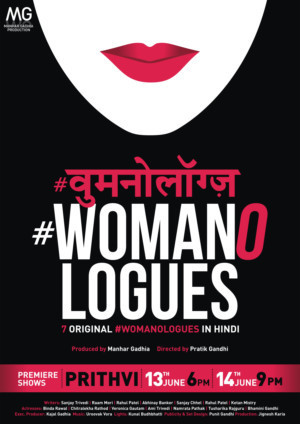Review: Why #WOMANOLOGUES! Paves The Way For More Regional Theatre In India
 As the influx of modern forms of tech advanced sources of entertainment intensifies across the world, the scope of organic, simpler forms of art often seems diminishing. And it won't be wrong to say that theatre as a medium of simple story telling in audience to performer one-to-one format may have taken a beating. So, when a play in a regional language manages to evoke the interest of modern story seekers and is translated into other popular languages it is worth saying that there may be hope for great stories and regional theatre.
As the influx of modern forms of tech advanced sources of entertainment intensifies across the world, the scope of organic, simpler forms of art often seems diminishing. And it won't be wrong to say that theatre as a medium of simple story telling in audience to performer one-to-one format may have taken a beating. So, when a play in a regional language manages to evoke the interest of modern story seekers and is translated into other popular languages it is worth saying that there may be hope for great stories and regional theatre.
#Womanologues by Manhar Gadhia, a play in Gujarati exactly seemed to have done just that. Staged in Mumbai last month, #Womanologues, comes from the house of Gadhia who has been known for important and remarkable work in the field of Gujarati theatre. The play is the season 3 of his production Saat Teri Ekvis in Hindi.
Pratik Gandhi takes the baton as the solo director for seven short, powerful stories. While the broad theme of desire forms the underlying current in all the stories, the treatment is uniquely different for each tale. it was the success of these stories told in Gujarati that led to the need for a Hindi version and the acceptance of the play in Hindi has been immediate. the stories encompass a gamut of characters. Whether it is Govinda loving Apeksha in the story by the same name or Toral in Toral Joshi tinder who makes no bones about being on Tinder, each story brings along a depth of characters.
The seven stories keep the momentum assuring that there is never a dull moment during the performances. The stories range from those of a girl discovering herself to the ones of a girl on the threshold of an arranged marriage or to that of a woman discovering facets of motherhood, but through all these different situations and characterizations the audiences get to witness the many different aspects of womanhood.
The play proves that language is not a bar for stories that have a connect with an audience. And on that note we won't be surprised to find an English version of the play coming up next. But until then, enjoy the crisp, new Hindi version next time it is ataged.
Videos
